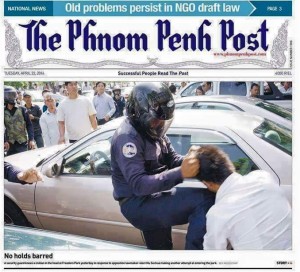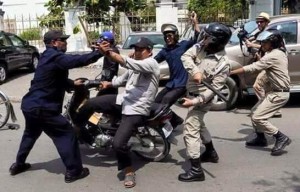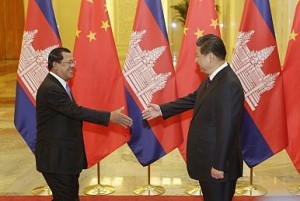Culture
now browsing by category
Notorious Court in Cambodia
The heated up political tension orchestrated by Hun Sen is to simply use the court as his experiment tool of throwing fire into a cold water. CNRP has boldly claimed its nonviolence and culture of dialogue during this tension.
How much have we known the notorious court in Cambodia?
Khmer people believe that in the past our court system was using “oath or swear” conducting to ensure individual sincerity and integrity. The state administration was “Deva-Raja” or “Cult of Personality” that King was named Universal Ruler. There are no scientific evidence to ensure the preciseness resulting from those swearing testimonial performance, and how much the state performed free and independent procedures.
In the West, Thomas Hobbs aggressively criticized the “State of Nature” in
which holy man is the ruler. Hobbs called such ruler “Leviathan” who critically proclaimed their specific legitimacy from the sky angel.
During the Khmer Rouge regime, the court was also set up to legitimize their brutal leadership. Now, it has inherited to the present Cambodia government under Hun Sen leadership, the same court has been used to threat and jail the dissents.
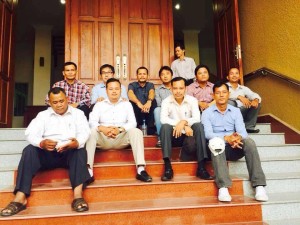
The 11 protesters were jailed by the court in the charge of national insurrection happened immediately after Hun Sen warned in his televised speech.
How Cambodia country as an institution can bring down the leader(s), tycoons, or politician(s) who have pervasively and evidently abused the power to deviate the neutral and independent court of Cambodia?
This puzzling question has remained unanswered.
In Canada, looking from my daily lenses, the smallest problem happened, it has been brought up to the court, at the same procedure with the biggest problem. For instance, if I was driving in high speed, the road-camera or
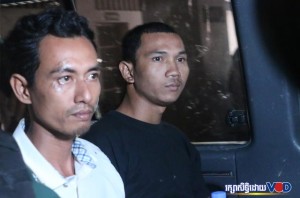
The two latest protesters are jailed including one in custody in the charge of assisting national insurrection happened after Hun Sen warned during his televised speech.
onsite policeman will send or hand me the ticket with proof of photo, and the ticket gives us two options: to pay voluntarily or to appeal to the court. The biggest problem, Prime Minister or Minister or high profile entity, shall face with the court at the same procedure like everyone if those committed legal fault.
One of the citizenship obligations is to sit as jury in the court. This is an encouragement for all to learn about the legal procedures and understand this common duty.
Cambodian people have been bitterly suffered by the court system. With no doubt, leader has blinded them for their own advantage.
Trans-Pacific Partnership: Do it for Vietnam
Trans-Pacific Partnership: Do it for Vietnam
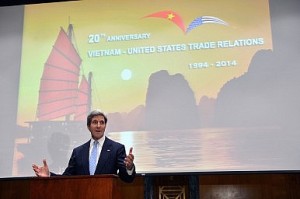
John Kerry Attends a Reception in Honor of the 20th Anniversary of U.S.–Vietnam Trade Relations
Image Credit: Flickr/ U.S. Department of State
Tyler Cowen, the prolific economist behind Marginal Revoution (a blog I’ve read for over half-a-decade and recommend), has a unique case in favor of the Trans-Pacific Partnership that relies on simple utilitarian logic. Simply put, the benefits of the TPP coming into effect outweigh the costs in a huge way. Particularly, the benefits for one country—Vietnam—are huge. In fact, Cowen makes that case that the benefit to Vietnam would be so huge that any costs borne by U.S. interest groups and constituencies are marginal. The benefits to Vietnam alone should make the TPP a “no brainer” of an agreement.
The economic reason is simple. The TPP, while it is many things, is at its core a tariff-effacing trade agreement for among its 12 signatories. Vietnam, meanwhile, is not only a poor country, but a country that remains at odds with the values and principles guiding the primary stakeholder behind the TPP: the United States. Vietnam, a Communist country, has undertaken some liberalization on tariffs, “but since then has done some backsliding,” writes Cowen. Specifically, after its entry into the World Trade Organization (WTO), Vietnamese tariffs “on products of interest” to the United States drastically, only to slightly increase them to come in line with the maximum of the range allowed under WTO bindings (see the U.S. Trade Representative’s report on Vietnam here).
Given that Vietnam does a lot of trade with the United States and that the TPP will slash major trade protections on the Vietnamese market, it follows that Vietnamese goods will be particularly competitive in a post-TPP context. In support of these claims, Cowen cites a simulation study by the Peterson Institute on International Economics that demonstrates the same (i.e., that Vietnam, of all countries party to the TPP, stands to benefit the most). A particularly telling statistic for the potential gains for Vietnam in a zero-tariff scenario is the following: in 2012, 34 percent of U.S. apparel imports came from Vietnam, amounting to $7 billion. In a zero-tariff scenario, these imports are suddenly far more competitive.
Political Paradigm of Pragmatism from the Khmer Youth part 30
Political Paradigm of Pragmatism from the Khmer Youth part 30
This part (30), the author Mr. Sophan Seng didn’t traditionally describe about the policy platform for political parties for the upcoming national election 2017 and 2018 as planned. He is articulating the four outstanding political events in Cambodia.
1. The government rushed to amend the law on civil society and NGOs (LANGO) without conducting proper consultations and participation from all stakeholders is a trouble for the nation. Parliament and Senate that are well-known for submission to the government or lacking independence, have unanimously approved the law. This LANGO is believed to impeding the independence and effective tasks of civil society that has played important role in democratization and nation-building of Cambodia.
2. The arrests and injail of those 11 political activists of the CNRP is a set-back political development in Cambodia. Hun Sen has no faith in his new political mean on culture of dialogue while Sam Rainsy, his counterpart, has confidently believed the culture of dialogue shall pave strong foundation for collective interests of Cambodia in a long run.
3. The borderline disputes between Cambodia and Vietnam have emerged as the continual conflicts that are poorly responded by the Cambodian government. Cambodian government has conducted self-hostaged border demarcation policy with Vietnam by accusing their own citizens as extreme, ultranationalism, or irrational on Vietnam’s encroachments. These accusations are in contrast with Vietnam who have encouraged their citizens along the borderline to protect their property.
4. International geopolitics changes among those superpower countries is very pressing. Vietnam’s official visit to strengthening tie with Obama administration has enabled Vietnam a boost in strategy to confront with China regarding the rifts of Sprately Island. Other Obama’s friends will approve the concert. Hence, Cambodia has moved closer with China that is believed to repeat past trauma if Cambodia is not managing this triangle relationship properly.
These four political events have heated up Cambodia as a small and fragile state. While the foreign policy requires strength within domestic politics, Hun Sen administration is seems lacking responsive and well-planned domestic policy especially to ensure unity. The amendment of LANGO law and the incarceration of those 11 political activists are showing Hun Sen’s non-visionary sight for Cambodia during this international geopolitics tension.
To bring back confidence and unity, as many believed, those 11 political prisoners must be immediately released, as the author has solemnly appealed for.












 Political Paradigm of Pragmatism from the Khmer Youth part 30
Political Paradigm of Pragmatism from the Khmer Youth part 30